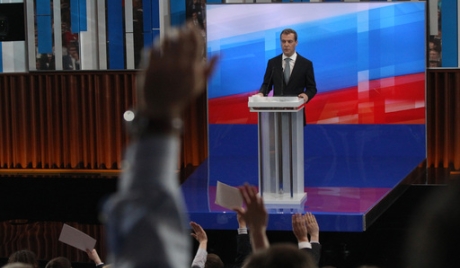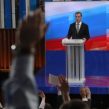
Moscow’s Political Observers Declare Medvedev Unqualified to Lead Russia
Publication: Eurasia Daily Monitor Volume: 8 Issue: 97
By:

After serving as Russia’s figurehead president for more than three years, on May 18, Dmitry Medvedev held his first major press conference involving more than 800 journalists (some 500 Russian and 300 foreign). Russia’s strongman prime minister, Vladimir Putin, during his tenure as president from 2000 to 2008, established a tradition of such major, long-lasting press events and clearly enjoyed them. Medvedev restricts himself to giving interviews, speaking from time to time with his small accredited press pool and attending short protocol press meetings after summits with foreign leaders.
There was much speculation about the May 18 event: that Medvedev may announce some important political initiative; declare he is decisively running (or not running) for president in 2012; dismiss some key ministers or the entire cabinet and so on (EDM, May 16; Ekho Moskvy, May 18). The anticipation of something important ready to happen lured troves of journalists to the conference hall of the management school in Skolkovo on the outskirts of Moscow—a vicinity Medvedev plans to turn into a technology hub (innovation center)—the Russian answer to Silicon Valley.
The actual event was an anticlimax: Medvedev answered 42 questions in 2 hours and 20 minutes and managed not to say anything new or disclose any specific plans for the future. Medvedev did not kick start his possible reelection campaign, nor was the gala conference a farewell event (Vedomosti, May 19). Medvedev announced that he and Putin are close friends and political allies, that there is no divergence between them about Russia’s future—only some “tactical differences” on how to achieve their common goals. Medvedev excluded the possibility of any democratic reforms in Russia in the foreseeable future. The restoration of the election of governors in Russian provinces and national republics, which since 2004 are appointed by the Kremlin, or the popular election of senators (members of Russia’s upper house of parliament – the Federation Council) may or may not happen “sometime in the future—in 10 or 15 years” (www.kremlin.ru, May 18).
Medvedev announced that now is not the time to make any changes in the Putin-led government, or to decide who—Medvedev or Putin—will run for president in 2012. Medvedev stated the if he does run for president, he wants to be endorsed and supported “by the same political forces” as in 2008—meaning ruling United Russia and its allies—the party Putin has pledged to lead in the coming December 2011 Duma elections under the mantel of a newly announced All-Russia Peoples Front. Medvedev repeated previously stated foreign policy positions by condemning the NATO-led bombing campaign in Libya and by threatening a new “Cold War” and arms race if the West continues with plans to develop missile defense in Europe without Moscow’s approval and participation. Medvedev announced Moscow will not allow the UN Security Council to pass a resolution denouncing repression by authorities in Syria “even if my friends ask me” (www.kremlin.ru, May 18). Medvedev has been criticized by Putin’s supporters for allowing UN Resolution 1973, which authorized the no-fly zone and NATO-led campaign in Libya. Putin has denounced the resolution as “flawed and defective,” calling the NATO-lead mission a “Medieval crusade” (EDM, March 24). Now Medvedev seems to be publicly pledging not to deviate toward the West by announcing “the Syrian leadership must be given an opportunity to resolve its internal problems without pressure” (www.kremlin.ru, May 18).
Before the press conference accredited journalists were encouraged to send questions for Medvedev to the Kremlin official site www.kremlin.ru. Medvedev promised to select and answer several of the 210 registered questions. At the end of the conference he did, and his choice bewildered observers. Medvedev described in detail a special federal program to support the herding of reindeer in the Russian Arctic that has helped raise the number of herded reindeer to 1.5 million, but noted that the financing of reindeer slaughter and the marketing of meat and hides must come from regional budgets. Medvedev also proclaimed the invasion of Georgia in 2008, which led to mass ethnic cleansing and permanent occupation of Georgian territory as the main achievement of his presidency: “This was very important for Russia to deem itself strong, no matter how other nations interpreted those events” (www.kremlin.ru, May 18). The radical military reform that began after the war with Georgia and is today faltering was not mentioned once.
Medvedev decided to answer questions and moderate the conference singlehandedly. His unprofessional performance added to the overall commotion and silliness of the event. Medvedev was clearly agitated by the challenge, constantly losing his breath during the first half of the conference, apparently caused by public speech stress. Time and again Medvedev had fits of seemingly uncontrollable giggling when answering questions, also apparently caused by public speech stress. The Kremlin press service announced “the president was pleased by his performance at the conference” (RIA Novosti, May 18). Officially approved observers were bewildered by the uninspiring performance. Known critics of the regime posted angry comments about Medvedev on the Internet demonstrating his utter inability to reform or lead Russia (RIA Novosti, www.newsru.com, May 18).
It seems Putin in 2007 wisely chose Medvedev as his “successor” or a de facto figurehead president. Medvedev, who this week demonstrated the absence of his leadership capabilities and charisma—a lack of intelligence and integrity—will hardly ever be able to effectively lead Russia in a time of change. Many Russians and foreigners who believed that Medvedev—the young and progressive president—will actually modernize, Westernize and liberalize Russia may forget their dreams. Medvedev’s constant chatter about “modernization,” with little or nothing being done, may only cause the Russian populace to begin to hate the term, as the word “democracy” became a popular curse after the unfair and lawless reforms of the 1990’s. Former Kremlin insider Gleb Pavlovsky believes Medvedev’s dismal press conference performance was intended to appeal to Putin to gain endorsement for a second presidential term (Vedomosti, May 19). This is a popular version in Moscow—Medvedev was doing his best to be seen as an incompetent and harmless political nobody for Putin to allow him six more years as a figurehead in the Kremlin.




